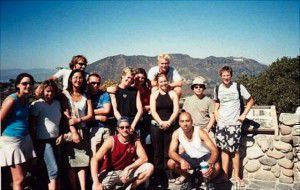Business or pleasure – it makes no difference
In an earlier post, I talked about the importance of learning a little bit of the local language before visiting another country. Not only is it the respectful thing to do, it also saves you from embarrassing misunderstandings or spending your entire holiday communicating through pointing and exaggerated mimes.
A few years ago, I visited Lithuania for a weekend. It was for a one-off sporting event and was therefore likely to be my first and last time in the country. I didn’t need to become fluent in Lithuanian, but thought I should make an effort (particularly given where I work!) so I spent a bit of time using Talk Now before I left, learning the words for ‘yes’, ‘no’, ‘hello’, ‘thank you’, ‘hotel’, and a few others. This allowed me to greet people, explain to taxi drivers where I wanted to go, and thank the staff in restaurants and shops in their own language. It wasn’t a lot, and there was still some pointing and gesturing required, but I felt better about myself and the locals seemed to appreciate my efforts.
I recently learned the story of how the idea for EuroTalk came about. One of our founders, Dick Howeson, was on a business trip in Hungary, waiting for a flight. He desperately needed to use the bathroom, but unfortunately, instead of pictures, the airport had used the words for ‘male’ and ‘female’ on the doors. This was a small problem for Dick, who didn’t speak any Hungarian, and had no way of knowing which was which. Unluckily, the airport wasn’t very busy at the time, and he had to wait twenty minutes for someone else to come along, so he could see which door they used.
 At the time, a lot of people had been asking Dick for a language program specifically for business people, but his experience in Hungary made him realise that those travelling for work needed to start with the basics just like everyone else, rather than going straight to learning the words for ‘invoice’ or ‘contract’. That’s why EuroTalk software starts by teaching you the essential first words you need to get by – including ladies’ and gents’ toilet!
At the time, a lot of people had been asking Dick for a language program specifically for business people, but his experience in Hungary made him realise that those travelling for work needed to start with the basics just like everyone else, rather than going straight to learning the words for ‘invoice’ or ‘contract’. That’s why EuroTalk software starts by teaching you the essential first words you need to get by – including ladies’ and gents’ toilet!
Our newest iPhone app, uTalk, is based on exactly the same thinking. It’s free to download and gives you 15 words in 25 languages (with lots more on the way). And not only that, it also contains all the EuroTalk games you know and love, plus some new ones, to help you remember them. If you decide you want to learn more, there are upgrades available to unlock loads more vocabulary.
So if you’re planning your summer holiday – or a business trip – now is the perfect time to download uTalk, and wherever you go, you’ll be prepared.
Liz
Don’t be shy, get talking!
A recent poll has found that only one in ten British travellers learn any of the language before they visit another country. Some claimed this was because English is now so widely spoken, while others blamed shyness and a fear of saying the wrong thing.
I understand the second excuse much more than the first. Just because we can get away with speaking English doesn’t mean we should. Learning just a few words can make a huge difference, not only to those you’re speaking to but to your own holiday experience. And you don’t have to learn anything complicated. Five per cent of people surveyed said they just learnt the absolute basics, like hello, please, thank you, water and beer. Sometimes all it takes is a friendly greeting in someone’s native language, and they see you in a whole new way – as someone who respects their culture and has made an effort, however small. And that will come across in the way they treat you, making your time in the country a lot more fun. Not only that but you’ll feel pretty good about yourself – I remember several years ago on a school trip to Spain, a friend of mine ordered an ice cream in Spanish. An ice cream – it was as simple as that. But she was so proud of herself when the vendor understood her and she completed the purchase in a language not her own.

Benny Lewis, who’s known as the Irish polyglot, has spent nine years travelling in different countries, learning languages as he goes. Every few months he announces a new challenge, learns some vocabulary and then – he just goes to the country and starts talking. He doesn’t worry about making mistakes or getting his grammar slightly wrong.
Obviously we’re not all as brave as Benny. I’m certainly not. But there does come a point when you have to stop being scared and just take a risk. People are not going to point and laugh if you don’t pronounce something quite right. As a general rule they’ll be so pleased to hear you trying to speak their language that they won’t mind at all, and will probably go out of their way to help you get it right next time.
So let’s be brave! Next time you go on holiday try learning a few basics before you go, and see what a difference it makes…
Liz
The beginner’s guide to London
As London welcomes visitors from all over the world this week, we’ve put together our own guide to the city, with a selection of hints and tips to help you feel like a local…
While you’re here
– Why not take the River Bus from Putney to Blackfriars, then on to Greenwich? It’s a fast and comfortable way to cross the city, with amazing views – and no traffic jams!
– A visit to Shakespeare’s Globe will set you back just £5 for a standing ticket and is well worth it, as long as the sun’s shining… Or you could see a show in the West End – there are discount ticket booths in Leicester Square and Covent Garden where you can buy tickets for the same day.
– Go and take a look at The Shard – the tallest building in Western Europe, which has just opened near London Bridge (be prepared for a sore neck). From next year visitors will be able to travel to the top and take in the amazing views – but in the meantime, here’s a website that lets you see what you’re missing. It really is pretty special.
– If you fancy getting out of the city centre, Richmond Park and Kew Gardens are lovely – although not far from town, you’ll feel like you’re in the countryside. At Richmond, you can even see their famous deer herd.
– London boasts some fantastic free museums; we recommend the Science Museum, Natural History Museum, British Museum and the Tate Galleries, but there are plenty of others to choose from.
Useful tips
– If you’re not going far, don’t take the London Underground (also known as the Tube) – you’ll find it’s much quicker, cheaper and cooler to stay at street level and walk. This is particularly true of stations on or near the Circle Line so don’t get caught out! You can’t go too far without stumbling across a station, and there are maps pretty much everywhere, so it’s quite hard to get lost. But if you are travelling on the Tube, get yourself an Oyster Card, it’s by far the easiest way to pay for your tickets.
– Alternatively, if you want to be able to see where you’re going, but don’t fancy the bus, try hiring a ‘Boris Bike’ (named after Mayor of London, Boris Johnson, in case you were wondering). You can just pay and go, then when you’re finished, return the bike to any of the docking stations located around London – no need to bring it back to where you started.
– Most people don’t really talk in Cockney Rhyming Slang, so if you try addressing someone as your ‘china plate’ you may get some funny looks. But then again, we don’t all talk like The Queen, either. Terribly sorry, old bean.
– To feel like a real Londoner, just roll your eyes and say to random strangers, ‘Well at least the sun’s come out at last.’ You’ll fit right in.
– On a similar note, do remember to come prepared for all weathers – a typical bag should contain sun cream and sunglasses as well as an umbrella and some warm layers of clothing.
– And finally, food – we have some strange names for our dishes, so be prepared. For instance, black pudding is not, in fact, a pudding but a type of sausage (and something of an acquired taste). Eton mess sounds horrible but is actually a very tasty dessert featuring strawberries, meringue and cream. And toad in the hole does not contain any toads. Honest.
Most importantly, we hope you enjoy your visit! And don’t be afraid to ask the locals for help – we Brits may seem a bit grumpy (especially during rush hour) but underneath we’re really very nice people…
Are you a Londoner with some useful advice? Or maybe you’re visiting and have already discovered a hidden gem? Please share them in the comments!
Liz and the EuroTalk team
There’s something different about this one…
I see myself as a moderately well-travelled person, having visited most of Europe, Hong Kong, Japan and the southern states in the USA. Many memories are made on each trip, whether they are about trying strange food, meeting friendly locals or even having the odd moment of hilarity – but one thing I always find is that confusion crops up about my ethnic appearance. I’m not even sure if it’s in a good or bad way.
I’m a British Born Chinese, speak English fluently and studied Spanish at university, so I am pretty comfortable with visiting most parts of the world. I don’t have any qualms about learning even more languages, if it helps me get by. But my appearance seems to evoke different…. responses.
 For instance, a short conversation while getting coffee at a gas-stop in New Mexico left a cashier confused when she said I (apparently) spoke like the Queen. Flip side to this: during a night out in Acuña, Mexico, a bartender was surprised to be able to talk to me in great detail about how film director Robert Rodriguez used his tavern to film a part of his feature Desperado, as I was the only one who could speak and understand Spanish – something that also helped make a complaint about a dirty and unmade hotel room in Las Vegas.
For instance, a short conversation while getting coffee at a gas-stop in New Mexico left a cashier confused when she said I (apparently) spoke like the Queen. Flip side to this: during a night out in Acuña, Mexico, a bartender was surprised to be able to talk to me in great detail about how film director Robert Rodriguez used his tavern to film a part of his feature Desperado, as I was the only one who could speak and understand Spanish – something that also helped make a complaint about a dirty and unmade hotel room in Las Vegas.
A weird occurrence was when a tourist wanted a picture taken with me during a visit with friends to the Carlsberg Museum in Copenhagen. The reason? He had never seen a Chinese person before.
Multiculturalism is growing everyday and so more people are becoming accustomed to different ways of life. But there are parts of the world that are not so used to ethnic diversity, and particularly given Asians’ distinctive appearance, seeing someone different walk through the door will always have that element of surprise. Even more so if that person can talk and understand you – that always raises a smile… or perhaps a furrowed brow.
Do you find yourself surprising people on your travels with your linguistic abilities? Or have you met someone who catches you unawares by conversing in your native tongue?
Katie
A Lonely Planet?
Ask your grandparents where they went on their honeymoon and the vast majority will answer that they went to some seaside town within their own country. My grandparents for instance went to Scunthorpe, and by all accounts had a brilliant time. Now look at the destinations of the people who have recently been married around you, or those just heading away for a trendy city break or backpacking around the globe. Just in our office alone I am sure we can cover most of a world map with little flags signifying the countries we have visited. My point? The world appears to be shrinking and with it comes a certain amount of damage to areas of unprecedented beauty and to some of the many wonders of the world.
 In certain cases an increase in popularity or accessibility can lead to a few oddities, and fun, if unsympathetic activities. For example, in China at the UNESCO protected site of Mutianyu, what better way to place yourself in the shoes, or sandals, of the Mongol hordes than tobogganing down the side of the Great Wall of China? The same occurs at the site of the bridge over the river Kwai. The museum explains the history of the Burmese railroad, the numbers who died in its construction and the events portrayed in the 1957 film. You can then ride across the bridge on a traditional garishly rainbow coloured, road worthy train. Small gripes I know but are we not losing the significance of these sites by diluting them with fairground distractions? Or do these attractions simply add to the entertainment value of an area?
In certain cases an increase in popularity or accessibility can lead to a few oddities, and fun, if unsympathetic activities. For example, in China at the UNESCO protected site of Mutianyu, what better way to place yourself in the shoes, or sandals, of the Mongol hordes than tobogganing down the side of the Great Wall of China? The same occurs at the site of the bridge over the river Kwai. The museum explains the history of the Burmese railroad, the numbers who died in its construction and the events portrayed in the 1957 film. You can then ride across the bridge on a traditional garishly rainbow coloured, road worthy train. Small gripes I know but are we not losing the significance of these sites by diluting them with fairground distractions? Or do these attractions simply add to the entertainment value of an area?
In Thailand I also visited Koh Phi Phi, a small island chosen as the location of The Beach, a Leonardo Dicaprio film and book by Alex Garland, which portrayed a utopian island experience far away from the western confines of the mass backpacker route. 
Ironically the setting for this isolated paradise is now one of the most visited areas in Thailand and ’the Beach’ is now thronged with noisy tourists; the Andaman waters are now gleaming because of the residue left from the flotilla of tourist-packed speed boats that arrive at the location twice a day. Despite the numbers of tourists, ‘the Beach’ topped almost all guide books as a must-see, and whether I had been there was the first question fielded from friends at home. In the end it was simply a ticked box rather than a once in a lifetime experience.
What I am trying to determine from these small examples are the opinions of other tourists and travellers. I wanted to go somewhere because it was famous. People have heard of ‘the Beach’ and everyone knows about the Great Wall of China. But should the accessibility to these locations be limited? Is accessibility a good thing?
The example I want to finish on is Tibet. An area known by most people as a far outpost of China, an area little visited due to its isolation from, well, everywhere! It’s a spiritual area isolated from the western world, it takes two days by train to get there. With China planning a high-speed rail link to the area, how long will it be before you can toboggan from the top of Lhasa’s famous monastery?
Glyn






